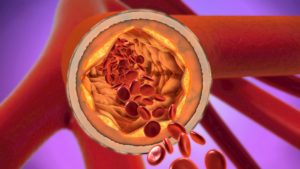
For example, you can’t really tell that blood has an increasingly difficult time moving through your arteries. Over time, your arteries and blood vessels harden and your body doesn’t produce the same chemicals to help promote blood flow. Factor in the potential of atherosclerosis and you could be at major risk for a heart attack or stroke without even knowing it. No wonder heart disease is called “the silent killer.”
Even though you can’t see your arteries hardening, shrinking, or see how well blood is moving, you can take steps to provide some comfort. By eating certain foods, avoiding others, and increasing activity, you’ll have the potential to restore your arteries and reduce the risk for a heart attack.
One of the things you can do is include foods that stimulate the production of nitric oxide, a gas that helps arteries relax to encourage better blood flow. Foods that can boost nitric oxide levels include: beets, garlic, pomegranate, leafy greens, and meat.
Another way to improve blood flow is eating more healthy fats. Healthy fats like omega-3’s, polyunsaturated fats, and monounsaturated fats can all lower the impact of LDL. These fats increase the “good” HDL cholesterol, which can help remove “bad” LDL plaques that clog arteries. Foods with these fats include olive oil, avocado, nuts and seeds, and fatty fish. High fiber foods can do the same, and include oats, whole grains, legumes (beans), fruits, and vegetables.
Lastly, getting some exercise can also help relax arteries and encourage blood flow. Exercise might also help with metabolizing cholesterol. Research indicates that exercise can help boost HDL, while stimulating enzymes to break down LDL, encouraging better circulation and less risk for stroke or heart attack. Exercise at a moderate pace for roughly 30-45 minutes per day.
When it comes to taking care of your cardiovascular system, prevention is essential. A number of factors influence heart health and knowing what you can do to stay as healthy as possible can keep a major episode from sneaking up on you.